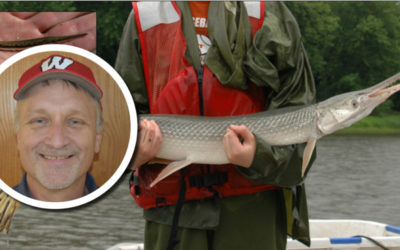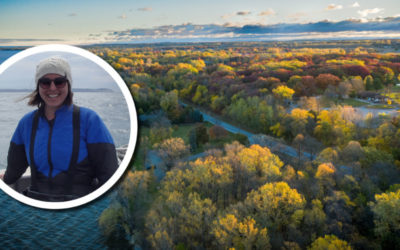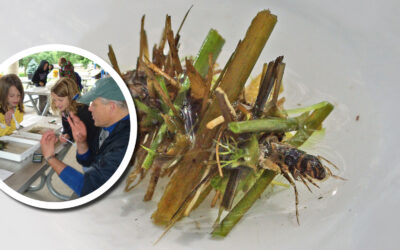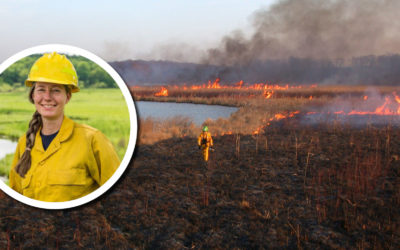Wetland Coffee Break
The Wetland Coffee Break series helps keep our community of wetland lovers connected and learning about wetlands throughout the year, from anywhere! Bring your coffee and learn about wetlands, the plants and animals that call them home, and the many natural benefits they provide to our communities. Sessions are held on Zoom and feature time for audience Q&A.
See below for a list of upcoming presentations and to register. Once you register, you’ll receive an automatic email including the URL link and password you’ll need to access the meeting. We record and post each presentation so you can watch any that you missed live. You’ll find links to these recordings below, and you can also find them on our Facebook page.
We are grateful to all of the presenters for sharing their knowledge and expertise and to everyone interested in learning more about wetlands! If you are interested in giving a Wetland Coffee Break presentation, or if you have a wetland topic you’d like to see covered, please contact Katie.Beilfuss@wisconsinwetlands.org.

Register for a Wetland Coffee Break
What’s the buzz? Drone uses in wetlands
Friday, May 31, 2024
10:30 am CT
Description
Drones and wetlands. Like apple pie and cheddar cheese, they are great on their own, but even better together. Drones can do a lot more than take pretty pictures. We can now utilize drones for high-resolution imagery, artificial intelligence, spraying invasive species, or seeding native species. Samantha Loutzenhiser of KCI Technologies will introduce some of the uses of various types of drones, their use cases, and laws and regulations.
Samantha Loutzenhiser has 11 years of experience in ecological restoration, wetlands, and invasive species. She is a Part 107 Remote Pilot and, for the last six years, has been using drones to benefit restoration sites. Samantha is also certified by the FAA as a Chief Supervisor in UAS agricultural systems operations, allowing her to apply herbicides with a drone under a Part 137 exemption.
Let’s talk turtles!
Friday, June 7, 2024
10:30 am CT
Description
Ever wonder what kind of turtle you just found crossing the road, or how to tell one kind of turtle from another, or where to look to find them? If so, this is the Wetland Coffee Break for you! We’ll discuss the 11 kinds of turtles that are found in Wisconsin as well as their ranges and preferred habitat(s).
Rebecca Christoffel is the Co-Director of Turtles for Tomorrow (https://turtlesfortomorrow.org) and owner of Christoffel Conservation. She has had a lifelong love of unhuggable wildlife, those animals that are less well-known and less appreciated by people. Prior to her return to Wisconsin, she was a faculty member and state wildlife Extension biologist at Iowa State University.
Restoring wetlands in the Mukwonago River watershed: The Mukwonago Davis Restoration Project
Friday, June 21, 2024
10:30 am CT
Description
In 2018 the Waukesha County Land Conservancy partnered with the Wisconsin DNR and The Nature Conservancy to complete a 52-acre wetland restoration in southern Waukesha County adjacent to the Mukwonago River, an important piece in the larger conservation landscape of the region. The project was funded through the Wisconsin Wetland Conservation Trust, an in-lieu fee wetland mitigation program. Now in Year four, the project is providing water quality improvement, flood abatement, and wildlife habitat to the Mukwonago River watershed. Josh Brown (Wisconsin DNR) and Allison Romero (Waukesha County Land Conservancy) will share about the experience of project planning, restoration, and maintenance, highlighting the trials and tribulations of implementing a large wetland restoration project through key partnerships.
Josh Brown is the In-Lieu Fee Wetland Mitigation Coordinator at the Wisconsin DNR. He oversees the program administration and implementation of 14 mitigation projects across the state. He has been with the DNR for 12 years.
Allison Romero has been with the Waukesha County Land Conservancy since 2022.
Wetlands and Phragmites: Management at a landscape scale
Friday, June 28, 2024
10:30 am CT
Description
Wetlands are dynamic by nature, but this variability affords many opportunities for invasive plants, like non-native Phragmites, to establish and spread. Additionally, increased landscape alteration, combined with the evolutionary advantages of Phragmites, often makes management of this plant difficult and expensive. In this presentation, Matt Puz, Wisconsin DNR, will discuss wetland dynamics, Phragmites biology and ecology, and how understanding these two concepts can lead to more effective management.
Matt Puz is the statewide Wetland Invasive Plant Specialist with the Wisconsin DNR, where he manages control efforts, directs research, and provides guidance and support for all things wetland invasive plant related. He has a Master’s degree in Conservation Ecology from the University of Michigan, where he researched hydrologically-restored wetlands.
On, in, and underwater: Life cycles and life history of wetland invertebrates
Friday, July 19, 2024
10:30 am CT
Description
Aquatic insects and other invertebrates are the most diverse and abundant freshwater organisms inhabiting wetland ecosystems. Join Dr. Jessica Orlofske of UW-Parkside to learn about Wisconsin’s wetland invertebrates that skate on the surface, swim in the water column, or crawl along the substrate. Dr. Orlofske will discuss the life cycles of these invertebrates as well as some of their life history adaptations. Understanding the roles, traits, and behaviors of these dynamic organisms can help us to appreciate their contributions to ecosystem function as well as their role in freshwater biomonitoring.
Jessica Orlofske is an Associate Professor in the Biological Sciences Department at the University of Wisconsin – Parkside. Dr. Orlofske teaches a variety of courses including invertebrate zoology, principles of ecology, freshwater ecology, and biostatistics. Dr. Orlofske received her undergraduate degree from the University of Wisconsin – Stevens Point and graduate degrees from Iowa State University and the University of New Brunswick (Canada). Dr. Orlofske’s research focuses on invertebrate conservation and environmental monitoring.
Watch previous presentations
Click “Older Entries” below to see more past presentations, or view our Google Sheet index of past presentations here.
Wetland Coffee Break: The fascinating fishes of the floodplains of Wisconsin’s largest rivers
The Mississippi, Wisconsin, Wolf, and other large rivers in Wisconsin have extensive floodplain wetlands that support a diverse fish fauna. Some species are important gamefish, but most are little-known yet vitally important to a healthy ecosystem. Join John Lyons,...
Wetland Coffee Break: Establishing a Green Bay National Estuarine Research Reserve
Two years after her first Wetland Coffee Break on this topic, UW-Green Bay Director of Freshwater Strategy Emily Tyner will provide an update on the designation of the Bay of Green Bay as a National Estuarine Research Reserve (NERR).
Wetland Coffee Break: Wetland restoration within the chaos of our shifting world
Wetland restoration gives us opportunities to respond to climate change impacts and, at the same time, becomes more difficult within a chaotic climate both current and unfolding. How can we navigate these dilemmas?
Wetland Coffee Break: Big Seeds: The Land Restoration School
The Land Restoration School is bringing together a range of theoreticians and practitioners in a bold attempt to launch the careers of ambitious and dedicated individuals who will form a community for the future.
Wetland Coffee Break: It’s the little things that run the world
Join stream ecologist Mike Miller to learn about the variety of invertebrates found in Wisconsin’s flowing waters and connected wetlands.
Wetland Coffee Break: The role and application of prescribed fire in Wisconsin wetlands
Join Hannah Spaul, Director of Land Management for The Nature Conservancy in Wisconsin, to learn about the historic role of fire in the state’s wetlands.






